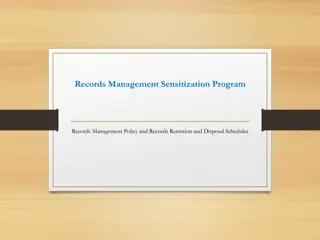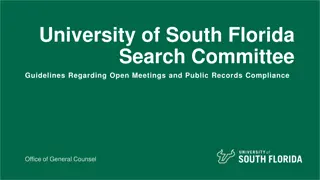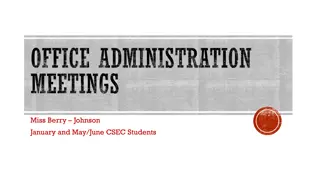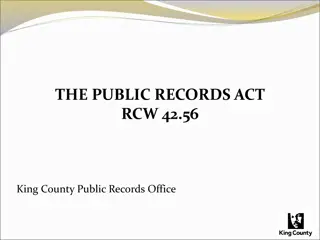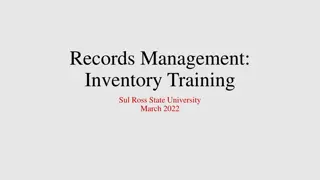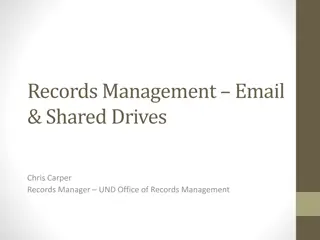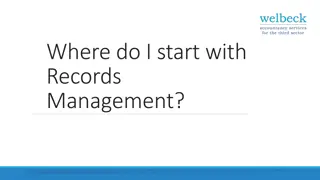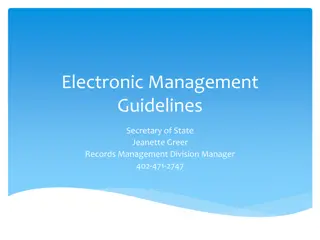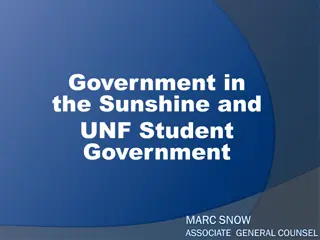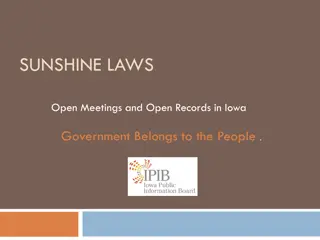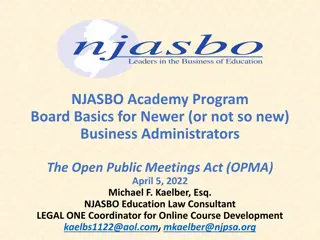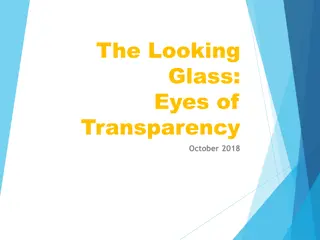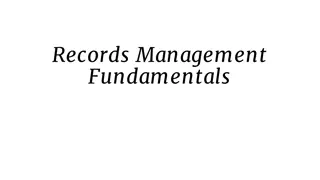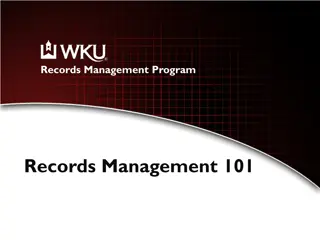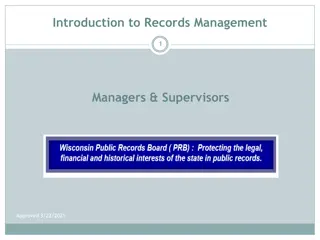Open Meetings & Public Records: Iowa's COVID-19 Guidelines
Explore guidelines by the Iowa Public Information Board for conducting open meetings and managing public records during COVID-19. Understand the importance of transparency in government operations. Learn how to provide public notice, conduct meetings, and ensure accessibility in compliance with Iowa laws.
Download Presentation

Please find below an Image/Link to download the presentation.
The content on the website is provided AS IS for your information and personal use only. It may not be sold, licensed, or shared on other websites without obtaining consent from the author. Download presentation by click this link. If you encounter any issues during the download, it is possible that the publisher has removed the file from their server.
E N D
Presentation Transcript
Open Meetings & Public Records in the Time of COVID-19 Presented by the Iowa Public Information Board Margaret Johnson Executive Director Zach Goodrich Legal Counsel Sponsored by the Iowa State Bar Association Government Practice Section
A popular government, without popular information, or the means of acquiring it, is but a prologue to a farce or a tragedy; or, perhaps both. - James Madison
Chapter 21: Open Meetings Chapter 22: Public Records Chapter 23: IPIB Act
Chapter 21 Open Meetings 21.3: Meetings of governmental bodies 21.4: Public notice 21.7: Rules of conduct at meetings 21.8: Electronic meetings
Pre-COVID Language Iowa Code section 21.3: Meetings of governmental bodies shall be preceded be public notice as provided in section 21.4 and shall be held in open session unless closed sessions are expressly permitted by law. Except as provided in section 21.5, all actions and discussions at meetings of governmental bodies, whether formal or informal, shall be conducted and executed in open session.
Pre-COVID Language Iowa Code section 21.4(1)(a-b): Except as provided in subsection 3, a governmental body shall give notice of the time, date, and place of each meeting including a reconvened meeting of the governmental body, and the tentative agenda of the meeting, in a manner reasonably calculated to apprise the public of that information. Reasonable notice shall include advising the news media who have filed a request for notice with the governmental body and posting the notice on a bulletin board or other prominent place which is easily accessible to the public and clearly designated for that purpose at the principal office of the body holding the meeting, or if no such office exists, at the building in which the meeting is to be held. Each meeting shall be held at a place reasonably accessible to the public and at a time reasonably convenient to the public, unless for good cause such a place or time is impossible or impracticable. Special access to the meeting may be granted to persons with disabilities.
Pre-COVID Language Iowa Code section 21.7: The public may use cameras or recording devices at any open session. Nothing in this chapter shall prevent a governmental body from making and enforcing reasonable rules for the conduct of its meetings to assure those meetings are orderly, and free from interference or interruption by spectators.
Pre-COVID Language Iowa Code section 21.8(1): A governmental body may conduct a meeting by electronic means only in circumstances where such a meeting in person is impossible or impractical and only if the governmental body complies with all of the following: (a) The governmental body provides public access to the conversation of the meeting to the extent reasonably possible. (b) The governmental body complies with section 21.4 [public notice]. For the purpose of this paragraph, the place of the meeting is the place from which the communication originates or where public access is provided to the conversation. (c) Minutes are kept of the meeting. The minutes shall include a statement explaining why a meeting in person was impossible or impractical.
Governors Proclamation September 18, 2020 SECTION ONE HUNDRED THIRTEEN Pursuant to Iowa Code 29C.6(6), and at the request of the Iowa League of Cities on behalf of numerous local governmental bodies, I continue to temporarily suspend the regulatory provisions of Iowa Code 21.8 [et al.], or any other statute imposing a requirement to hold a public meeting or hearing, to the extent that the statutes could be interpreted to prevent a governmental body from holding the meeting by electronic means, provided that the governmental body properly notices the meeting or hearing and includes a telephone conference number or website address that permits the public to participate in the meeting or hearing. I also temporarily suspend those statutes to the extent they could be interpreted to prevent a governmental body from limiting the number of people present at an in-person location of the meeting, provided that the governmental body provides a means for the public to participate by telephone or electronically as provided in this section.
COVID Modifications & Impact 21.3: No impact 21.4: No specific changes in requirements 21.7: Expanded rule policies 21.8: Governor s Proclamations did not change, but provided guidance on how to hold a COVID electronic meeting, especially when gathering limitations are in place
IPIB Cases of Interest Notice & Access - Henely v. Gilbert Schools, 20FC:0039, 20FC:0070, and 20FC:0073 Technical Difficulties - Simpson v. City of Essex, 20FC:0059 - Bloes v. City of Wall Lake, 20FC:0042
Lessons Learned Research options that will work best for your community. Do you have the equipment and infrastructure to hold a meeting with video access? Do you have a speakerphone, recording device, camera and microphone, or the other devices needed to conduct the meeting? Remember your community/audience needs. Your citizens may not have sophisticated electronic devices or the internet access you have at your disposal. Even though you are capable of doing a video chat, they may not be able to access your meeting. How can you notify your community on how to access the meeting? Posting a notice with access instructions on the bulletin board at the main office does not work if the building is locked. Perhaps having a test run of the system will allow the public (and your officials) to practice how to do an electronic meeting. Even if your council or board plans to meet in person, having remote access available for those members of the public who are at high risk for infection is a way to promote government transparency. If you need to conduct a closed session during your meeting, arrange ahead on how to properly conduct that meeting. You may need to have an alternate connection (such as a conference call number) for use during the closed session only. Remember to follow the requirements for detailed minutes and an audio recording of your closed session.
Chapter 22 Public Records 22.2: Right to examine public records - exceptions 22.3: Supervision - fees 22.4: Hours when available
Pre-COVID Language Iowa Code section 22.2(1): Every person shall have the right to examine and copy a public record and to publish or otherwise disseminate a public record or the information contained in a public record. Unless otherwise provided for by law, the right to examine a public record shall include the right to examine a public record without charge while the public record is in the physical possession of the custodian of the public record. The right to copy a public record shall include the right to make photographs or photographic copies while the public record is in the possession of the custodian of the public record. All rights under this section are in addition to the right to obtain a certified copy of a public record under section 622.46.
Pre-COVID Language Iowa Code section 22.3(1): The examination and copying of public records shall be done under the supervision of the lawful custodian of the records or the custodian s authorized designee. The lawful custodian shall not require the physical presence of a person requesting or receiving a copy of a public record and shall fulfill requests for a copy of a public record received in writing, by telephone, or by electronic means. Fulfillment of a request for a copy of a public record may be contingent upon receipt of payment of expenses to be incurred in fulfilling the request and such estimated expenses shall be communicated to the requester upon receipt of the request. The lawful custodian may adopt and enforce reasonable rules regarding the examination and copying of the records and the protection of the records against damage or disorganization. The lawful custodian shall provide a suitable place for the examination and copying of the records, but if it is impracticable to do the examination and copying of the records in the office of the lawful custodian, the person desiring to examine or copy shall pay any necessary expenses of providing a place for the examination and copying.
Pre-COVID Language Iowa Code section 22.4: The rights of persons under this chapter may be exercised at any time during the customary office hours of the lawful custodian of the records. However, if the lawful custodian does not have customary office hours of at least thirty hours per week, such right may be exercised at any time from 9:00 AM to 12:00 PM and from 1:00 PM to 4:00 PM, Monday through Friday, excluding legal holidays, unless the person exercising such right and the lawful custodian agree on a different time.
Governors Proclamation September 18, 2020 SECTION ONE HUNDRED FOURTEEN Pursuant to Iowa Code 29C.6(6) and Iowa Code 135.144(3), in conjunction with the Iowa Department of Public Health and at the request of the Iowa League of Cities on behalf of numerous local governmental bodies, I continue to temporarily suspend the regulatory provisions of Iowa Code 22.4 to the extent those provisions require a lawful custodian of records to maintain office hours to receive in-person record requests, so long as the custodian has posted clear direction for making requests in writing, by telephone, or by electronic means in a prominent place that is easily accessible to the public.
IPIB Cases of Interest Access to Records - Johnson v. Buchanan County Sheriff, 20FC:0064 Timeliness of Release - Informal complaints
IPIB was created to provide a free, efficient way for Iowans to receive information and resolve complaints related to Iowa s open meetings and public records law. We are a resource for you and here to help. Contact us if we can be of service. www.ipib.iowa.gov ipib@iowa.gov (515) 725-1781 Wallace State Office Building 502 East 9th Street, Third Floor Des Moines, Iowa 50319 Margaret Johnson Executive Director Zach Goodrich Legal Counsel Brett Toresdahl Deputy Director




